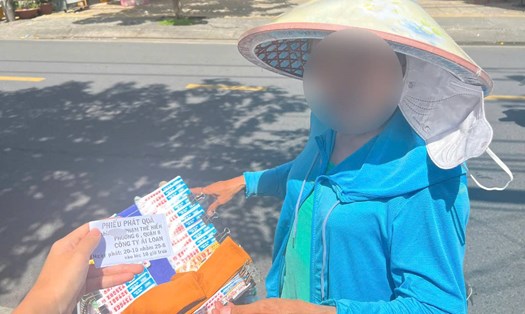Late at night, Ms. H.T.M (32 years old, in Cau Giay ward, Hanoi) received a message from a strange account on a social networking site named "user16423685**". The message began with a sharing that shocked readers: The doctor said I only have one month to live. I decided to spend this time traveling alone, quietly saying goodbye to the world. I don't have children, the only regret is not being able to live this life with you".
The senders also wrote that the recipient was their first love, a person always in their hearts. The end of the new message really surprised Ms. M.: I left you some assets. Keep this information. I prepared to delete my account and leave silently. Here is a link to a website called okx***.com, along with username, password and a number that stunned anyone: Balance 7,661,982 USDT.
At first, Ms. M. felt sorry for a lonely and weak person between the lines of life and death. But just a few seconds later, doubts appeared when she saw the text message mentioning "million-dollar surplus" and "logged in to receive property". Her professional instinct and knowledge of cybersecurity helped her stop in time. After researching, she discovered that this was a scam that had appeared in many countries and was spreading to Vietnam.
According to cybersecurity experts, this is a form of emotional scam, also known as romance scam - a form of information theft by taking advantage of pity and the trust of victims. The people behind often create a very tragic story: someone about to die, someone lonely abroad, or someone "finding an heir to inherit property". All are aimed at exploiting the emotions of readers, causing them to temporarily put aside their reason to follow the instructions. When recipients of curious messages click on the link, they will be led to fake websites of financial exchanges, where all personal data, social network passwords or e-wallets can be stolen in just a few seconds.
Many experts warn: Sammers now also use artificial intelligence (AI) to create touching messages, genuine language, and natural storytelling like real people write. When users enter information according to the instructions, all of their data can be taken over. This is a new variation of the tricks of "giving property before death" or " lovers sending gifts from abroad", but has been upgraded to be much more sophisticated".
According to the Department of Cyber Security (Ministry of Public Security), in 2025, social network scams will increase by more than 35% compared to the same period last year, of which nearly 20% will start with messages with such emotional elements. tragic stories, tearful lines have now become "prey" for bad guys exploiting human psychology.
Experts recommend that netizens need to be absolutely vigilant against strange messages, especially in cases where they claim to be "about to die" or "want to leave property". Do not access any links attached to the message, and do not enter login names, passwords or personal information on websites of unknown origin. Users should activate two-layer security (2FA) for social media accounts and e-wallets to increase safety, and immediately report to the platform if they detect any unusual signs.
The message "I only have one month to live" may be just a few un sentences generated by machines. But for the gullible, it could be the start of a real tragedy. On the internet, not everyone is real and not every touching story comes from the heart. In the midst of a world full of traps, just a second of vigil can save you from real loss. Remember, kindness is precious, but don't let kindness become a trap for bad people to take advantage of.













